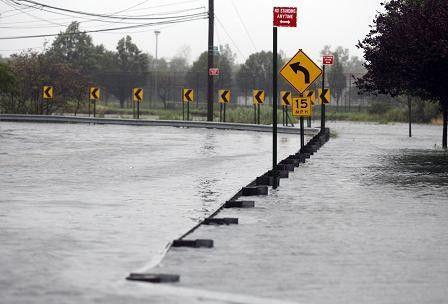Hurricane Irene Massachusetts: 150,000 Without Power, Coast Pummelled

In a nutshell, Massachusetts residents were spared the bulk of the wrath of Hurricane Irene, as the disrubance was downgraded to a tropical storm Sunday morning as it entered the Bay State; nevertheless, the storm uprooted hundreds if not thousands of trees and power lines, and caused extensive flooding.
No deaths or injuries in Massachusetts had been reported by Sunday at 11 a.m. EDT, according to Scott MacLeod, a spokesman for the Massachusetts Emergency Management Agency (MEMA), Boston.com reported Sunday.
State and utilities officials reported that about 150,000 customers had lost power as of Sunday at 10:30 a.m. EDT, and more outages are expected as the storm continues to progress through the state, the bostonherald.com Sunday.
Massachusetts will likely receive 3 to 6 inches of rain from Irene, National Weather Service officials said, with local amounts up to 10 inches possible.
State and local officials are also monitoring rivers and streams in Central and Western Massachusetts for flooding, as well as costal roads on the state's south coast, where ocean splashover historically causes flooding and makes roads hazardous/impassable.
In North Adams, Mass., a relatively minor mudslide compromised a natural gas line in the western Massachusetts, state officials said. Utility officials had the situation under control. No injuries were reported and Schwartz was not aware of any evacuations, the bostonherald.com reported Sunday.
MBTA Shut Down
The Boston metropolitan area's MBTA also shut down Sunday prior to the storm, which roared through the New York City area and New York state Saturday night / Sunday morning.
Maximum winds weakened -- and that term is used loosely -- to about 60 miles per hour (mph) Saturday night -- sparing New York, Connecticut, and Massachusetts the devastation that undoubtedly would have ensued had Hurricane Irene remained a Category 1 or Category 2 hurricane -- designations that contain 85 mph to 100 mph wind gusts.
After homes/businesses that lost power, air travelers may face the biggest hardship from the storm, officials said.
Airlines expect to cancel more than 9,000 flights this weekend from North Carolina to Boston, grounding passengers on the East Coast. There were more than 3,600 cancellations Saturday alone.
Officials in New York City said the metro area's three airports -- John F. Kennedy, LaGuardia, and Newark -- may not be fully functional until Tuesday -- something that would cause spill-over delays at other airports, due to the large percentage of flights that connect at and/or are routed to New York.
© Copyright IBTimes 2025. All rights reserved.




















